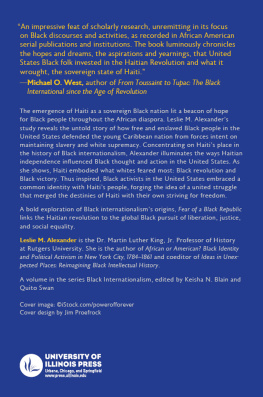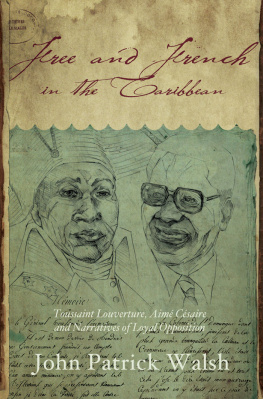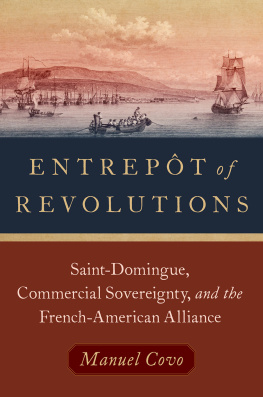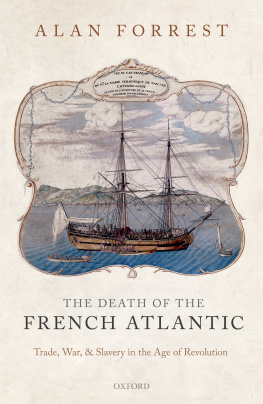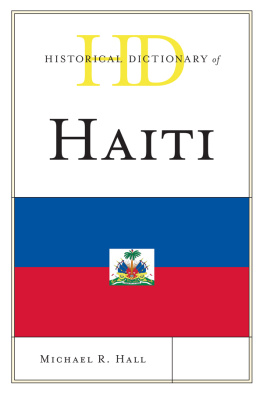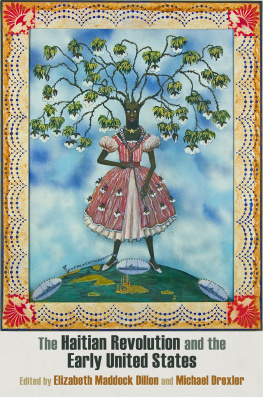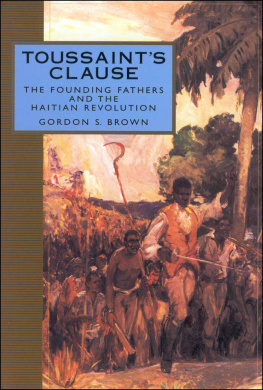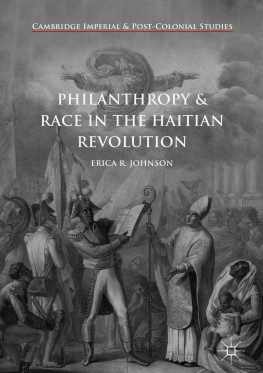HAITIS INFLUENCE ON ANTEBELLUM AMERICA
HAITIS INFLUENCE ON ANTEBELLUM AMERICA
Slumbering Volcano in the Caribbean
ALFRED N. HUNT
LOUISIANA STATE UNIVERSITY PRESS
BATON ROUGE AND LONDON
Copyright 1988 by Louisiana State University Press
All rights reserved
Manufactured in the United States of America
Designer: Sylvia Malik Loftin
Typeface: Trump Medieval
Typesetter: G & S Typesetters, Inc.
Printer: Thomson-Shore, Inc.
Binder: John H. Dekker & Sons, Inc.
10 9 8 7 6 5 4 3 2 1
Library of Congress Cataloging-in-Publication Data
Hunt, Alfred N., 1941
Haitis influence on antebellum America.
Includes index.
1. HaitiansUnited StatesHistory19th century. 2. HaitiHistoryRevolution, 17911804Influence. 3. HaitiForeign public opinion, AmericanHistory19th century. 4. Public opinionUnited StatesHistory19th century. 5. ImmigrantsUnited StatesHistory19th century. I. Title.
E184.H27H86 1987 973049697294 87-12488
ISBN 0-8071-1370-0
TO MY CHILDREN
Meta-Margret and Brian
Might not the San Dominick, like a slumbering volcano,
suddenly let loose energies now held?
Herman Melville, Benito Cereno
CONTENTS
ILLUSTRATIONS
ACKNOWLEDGMENTS
Scholars leave a trail of debts to many people who often give valuable help or support without realizing it; I have left such a trail over the years. My mentor, William H. Goetzmann of the University of Texas, is the most stimulating teacher I have ever seen. Robert Crunden and William Stott of Texas, Claude Nolen of St. Edwards University, and Edwin Redkey of SUNY, Purchase, were most helpful as colleagues and critics. The late Bell Wiley of Emory and Jack Greene of Johns Hopkins patiently endured my single-minded dedication to Haitian influences on American culture, in their respective National Endowment for the Humanities Summer Seminars. Special thanks go to three close friends with whom I have shared so much and who have given me so much: Brian Dippie of the University of Victoria, British Columbia, Raymund Paredes of UCLA, and Michael Hammond of SUNY, Purchase. Anyone involved in research knows what librarians do for them. I was fortunate enough to have three of the best to give me assistance: Jo Ann Hawkins of Texas, Connie Griffith of Tulane, and Paula Hane of SUNY, Purchase. I also want to thank the staffs of the following libraries and archives: Alderman Library, University of Virginia, Charlottesville; Boston Public Library; Charleston Historical Society; Haitian Bureau dEthnologie; Historic New Orleans Society; Howard-Tilton Memorial Library, Tulane University, New Orleans; Ilah Dunlap Little Memorial Library, University of Georgia, Athens; James P. Magill Library, Haverford College, Haverford, Pa.; Maryland Historical Society, Baltimore; Troy H. Middleton Library, Louisiana State University, Baton Rouge; National Archives, Washington, D.C.; New Orleans Public Library; Pennsylvania Historical Society, Philadelphia; William R. Perkins Library, Duke University, Durham; Schomburg Center for Research in Black Culture, the New York Public Library; Earl G. Severn Library, College of William and Mary, Williamsburg; South Carolina Archives, Charleston; South Caroliniana Library, University of South Carolina, Columbia; Southern Historical Collection, University of North Carolina, Chapel Hill; Virginia Historical Society, Richmond; and Robert R. Woodruff Library, Emory University, Atlanta. A Ford Foundation Grant, two NEH Summer Seminars, and a SUNY Research Grant greatly aided me in the costly business of archival research. I am grateful for the efforts of the staff at LSU Press, particularly Barbara ONeil Phillips, whose insistence on accuracy and clarity was profound. Any errors of fact or interpretation of the material are the responsibility of the author. My assistant, Selma Aronson of SUNY, Purchase, graciously helped with typing earlier versions and took care of many details in my office while I finished the manuscript. Margaret and Bob Callahan provided parental nurture even before I started this project some years ago.
HAITIS INFLUENCE ON ANTEBELLUM AMERICA
INTRODUCTION
Negro entered into white man as profoundly as white man entered into Negrosubtly influencing every gesture, every word, every emotion and idea, every attitude. These incisive words of southerner Wilbur J. Cash, written in the 1940s, foreshadowed the interest in black history and the recognition of its importance to the American experience. In preWorld War II America, the primary perspective from which whites viewed blacks was that of the master, atop his horse, overseeing his slaves toiling below. Slavery bequeathed a state of mind about the color line that precluded white Americans, and especially southerners, from perceiving the validity of Cashs observation. Happily, this distorted image is changingdue in part to the recognition that Cash was correct. Whites and blacks destinies have been intertwined, and black history is an intrinsic part of American history.
The influence of the Caribbean, particularly of Haiti, on the United States remains a neglected area of historical scholarship despite this new awareness of blacks role in American history. Interest in Haiti becomes evident only when spectacular events, such as the American occupation during the early twentieth century or the Haitian refugees desperate flight from poverty and oppression in the early 1980s, cause Americans to pause momentarily to consider the black republic. For the most part, however, Americans are not aware of Haitis historical significance and its influence on American life. Haiti provides a useful tool to get behind whites fears and blacks aspirations in the early nineteenth century. Further, the history of that republic suggests that in many ways the lower South, particularly the South of literary and political imagery, was the northern extremity of Caribbean culture. To view the South as an aberrant version of traditional American society (as is the opinion in the Northeast) is to misunderstand its history and to diminish the role that the Caribbean played in the development of the South up to the Civil War.
During the first half of the nineteenth century, many Americans, poets as well as politicians, used images of natural catastropheparticularly hurricanes, volcanoes, and violent stormsto characterize the times. No single event more suited these images than did the Haitian Revolution, which began in 1791 as a slave revolt in the French colony on the island of St. Domingue, and was unique as a servile insurrection because of the nature of the conflict, its duration, and its outcome. For thirteen years, the black population struggled against intransigent masters and foreign invaders to establish, in 1804, an independent black republic symbolically recaptured by rejecting its colonial name, St. Domingue, in favor of its aboriginal name, Haiti. This revolution had a significant impact upon both America and France, and provided the focal point for American attitudes toward the French Revolution, black freedom, and slavery.
Although many Americans expressed a lively interest in the insurrection in St. Domingue, slaveholding southerners were most concerned with the ominous events that led to the establishment of the first black republic in the New World. Indeed, that successful revolt may well have been the most important event causing slave owners to become increasingly recalcitrant about the abolition of slavery in the United States during the early nineteenth century. Vivid reports of the massacres in St. Domingue convinced southerners that the only thing they could expect from freed slaves was vicious retaliation. A Virginia newspaper stated that between five and six hundred white persons fell under the bloody hatchet of the Haitians, and the warm stream of blood which ran from them, quenched the thirst of their murderers, who went to their knees to receive it.1 Thus three generations of white southerners believed that race war would be the only result of the universal emancipation of slaves. Furthermore, southerners used the example of St. Domingue in support of their conviction that blacks were incapable of civilization on their own. To those looking for failure in the emancipation of the former French colony, Haiti represented an affront to the laws of nature and the republic was therefore doomed to fail. These lessons of the Haitian Revolution helped forge an ideology that differed significantly from the humanistic traditions of Western civilization, one that denies the ultimate humanity of blacks. This proslavery interpretation was based not on a sense of paranoia but rather on southerners erroneous interpretation of events in the French West Indies.


